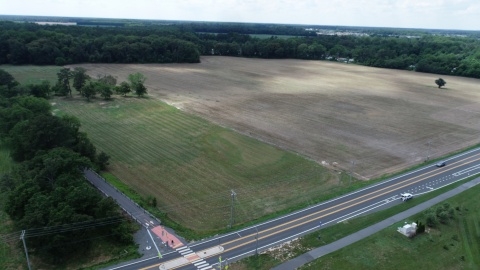
Georgetown, Del., June 21, 2022: Sussex County will keep a little more land in its landscape, thanks to the permanent protection of more than 150 acres in southern Delaware.
County officials on Tuesday, June 21, 2022, announced a series of open space purchases that will protect four parcels in eastern and central Sussex, where the landscape is under increased pressure from residential development. In total, the purchases will cost more than $5 million and preserve in perpetuity 151 acres of agricultural and wooded lands, including a portion of the prominent Lewes-area Hopkins Farm. Funding comes from County reserves, specifically savings realized through the County’s portion of Delaware’s realty transfer tax.
It is the latest effort by the County government in recent years to build the area’s open space inventory, often through partnerships, either through the purchase of development rights or by buying land outright. In the purchases announced, the County will own the acres acquired, but task the non-profit Sussex County Land Trust to assist in managing some of the future assets.
“This latest round shows the County Council’s commitment to land preservation, in terms of the significance of the dollars spent to the number of acres preserved,” County Administrator Todd F. Lawson said. “The public has called on us to do more to protect what makes Sussex County special, and these acquisitions that we announce today answer that call in a very big way.”
The properties the County has settled on include:
- Fifty-one acres known as the Hopkins Preserve, along Sweetbriar Road, just north of U.S. 9, outside Lewes, for a price of $1.5 million. The property owner, fourth-generation farmer Walter Hopkins and his family, discounted the sale price by 50 percent in exchange for the parcel being used at a later time as open space and a recreational amenity, specifically as part of a trailhead that will be developed and managed by the Sussex County Land Trust for the still-under-construction Georgetown to Lewes Trail;
- Forty-seven acres known as the Jones Family tract, at a cost of $650,000, located off Conaway Road adjacent to the State-owned Midlands Wildlife Area, west of Millsboro;
- Forty acres, named the Dawson Bros. tract, for a price of $2.5 million, located along the southside of Del. Route 24, near the Nanticoke Indian Center, east of Millsboro;
- Thirteen acres, for a sale price of $400,000, adjoining a larger parcel acquired by the County in 2020 and collectively known as the Dorman Family Farm Preserve, located along Herring Creek and Sarah Run, near Angola.
County officials highlighted the purchases as important pieces in the overall preservation puzzle, noting that it takes a cooperative effort among landowners, government officials, non-profit groups and others – especially in an era of soaring land prices – to make such important gains.
“It takes all of us working together to achieve that,” Council President Michael H. Vincent said. “In the end, it means a more preserved natural landscape, better protected habitat, improved water quality, and an enhanced way of life for Sussex County. That’s what the public wants.”
Hopkins said working with the County and the Land Trust to preserve his family farm was as much about giving something back to the community as it was to ensure agriculture’s legacy.
“Preserving this land and opening it to the public is the right thing to do,” Mr. Hopkins said. “Extending the adjacent bike trail around the property; forging extensive walking trails through the meadows and woodland; enhancing the wildlife habitat; encouraging the planting and growth of local flora – this is what I see for the property, and I look forward to the County and the Land Trust working together to bring that dream to fruition. This is truly a wonderful opportunity for the residents and visitors of Sussex County to enjoy for generations to come.”
SCLT officials said the public is looking to the stakeholders involved to produce tangible results, and initiatives like this go a long way to satisfying the community’s expectations.
“It’s one thing to buy the land. It’s something else to have a plan that guarantees the public’s access and ability to enjoy that land,” said Mark Chura, executive director of the Land Trust. “We look forward to carrying out our mission – and to realizing the vision of benefactors like the Hopkins family – so that our posterity can reap the rewards of the investments made today.”
###
